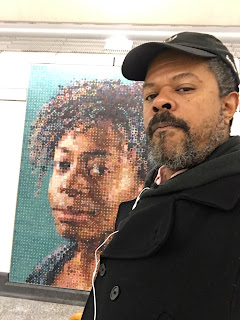For years I've regularly listened to literature and ideas podcasts but have long felt about far too many posted by mainstream US institutions lack any real diversity, some hosting lineups of invited artists and thinkers so un-diverse that it would be dishonest to describe them as practicing anything but intellectual, literary and cultural apartheid. Fortunately these days are increasingly more options, one of which I learned about last fall: Contemporary Black Canvas. Hosted by founder Dr. Pia Deas, a literature professor and scholar at HBCU Lincoln University in Pennsylvania, and available on the iTunes store and via the net (for your laptop), Contemporary Black Canvas aims, as Deas states on the sites landing page, to celebrate
the depth and breadth of the Black artistic and intellectual traditions from across the African Diaspora and Africa. Through conversations with leading writers, musicians, filmmakers, visual artists, dancers, radical gardeners, and institution builders, we examine the Black imagination as a vital, vibrant, and dynamic force for individual and collective transformation.
Generocity's Dante Kirby wrote an informative article about Deas and Contemporary Black Canvas, which I recommend. So far Contemporary Black Canvas has challenged black underrepresentation on the podcast front by hosting a rich array of contemporary cultural producers, including culinary artist Pascale Boucicaut and photographer Adachi Pimentel, curator and festival organizer Maori Karamel Holmes, visual artist Akili Ron Anderson, multiplatform artists Mendi+Keith Obadike, dancer and choreographer Lela Aisha Jones, and Poet Laureate of Philadelphia Yolanda Wisher. Most recently she invited me to participate in a conversation about Counternarratives and my work in general, and it was a wonderful experience (even if I do sound a bit of a spaz!). I really appreciated for the opportunity.
Please do consider adding the podcasts to add to your mix, and enjoy!
‡‡‡
I recently received the very good news that Counternarratives had made the shortlist for the inaugural Republic of Consciousness Prize for Small Presses! I'd previously written about the crowdfunded prize and how my collection made the longlist, which comprised some twenty works, many experimental in form and content, by independent publishers in the UK. The Guardian features a short writeup about the shortlist of 8 books, evenly divided between novels and short story collections, including a nice mention of Counternarratives. However it goes, many thanks to the judges and especially Neil Griffiths for establishing this way to honor small presses.
‡‡‡
Another positive mention for Counternarratives appeared in LitHub's list of the "Most Important Books of the Last 20 Years." One of the judges deemed the collection worthy of inclusion, so many thanks to whoever among that illustrious list selected my book. After reading through the list, which is long on imaginative literature (poetry, fiction, creative nonfiction, a few academic and journalistic books), a good thing, I think, but a bit short on scholarly books, so I posed the question on Twitter, which scholarly books published in the last 20 years would you list as the most important or influential? Please leave your suggestions in the comments section.
‡‡‡
Two recent reviews, one extended, the second brief, of the French edition of Counternarratives have been published. The longer one, by Juan Asensio, appeared on STALKER of Counternarratives / ContrenarrationsContrenarrations. Probing and laudatory, it also manages to broach some aspects of the book that haven't been touched upon at all in most of the books reviews, in the US or British press, including the book's exploration of marranos and conversos during the Inquisition era, and invokes figures ranging from Siegfried Kracauer to Leo Strauss (!) in discussing some of the ideas it contains. It's a wonderful piece, and I really appreciate that Juan Asensio engaged with the book so deeply.
French novelist Florence Noiville wrote a mini-review for major French daily Le Monde's book section, as part of their year-end 28 "Books in brief" section. She describes me as a "new voice in African American literature," which isn't really the case, but ends with "And to follow closely," which was nice. I hope French readers will do so, and buy the book.
Lastly, in Mediapart, Lisa Wajeman makes the case in her article "L'histoire noire américaine est devenue un sujet littéraire," which, based on French historian's Sylvain Pattieu's Nous avons arpenté un chemin caillouteux (We Have Walked Along a Stony Path), which explores Black Panthers Jean and Melvin McNair's 1972 hijacking of a plane to Algeria; Nate Parker's film Birth of a Nation, and translations of Ta-Nehisi Coates's meditative critical essay Between the World and Me and Counternarratives, African American literature has over the past year become a literary subject...in France. One fine touch is Wajeman's use of the concept of "counternarratives " to frame not only my book, but all the works under discussion.
 |
| "Employment of whites and black people in Georgia, and "Enslaved and free black people between 1790-1870," color plates from W. E. B. DuBois, The Georgia Negro: A Study, 1900. All rights reserved. |








































































